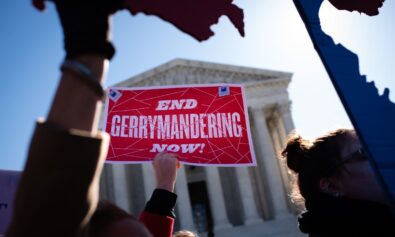An analysis of the early voting numbers in several crucial states bears good news for the Democrats, showing that a higher than expected percentage of the early voters in states like Georgia and North Carolina are young people and African-Americans who did not vote in the last midterm elections in 2010, according to The New York Times.
A look at the nearly 3 million votes that have already been cast in Georgia, North Carolina, Colorado and Iowa reveals that more than 20 percent have come from people who did not vote in the last midterm election. The Times characterizes these voters as far more “diverse” and Democratic than the voters in 2010 — 39 percent are registered Democrats and 30 percent are registered Republicans. Since registered Republicans outnumbered Democrats in these states by an average of 1 percentage point in 2010, the early results somewhat up-end the conventional wisdom by showing that perhaps Democrats are more motivated voters than the Republicans.
In order for Democratic Senate candidate Michelle Nunn in Georgia and Sen. Kay Hagan in North Carolina to win their races, the Democratic Party needs a groundswell of African-American support. The early indications are the party may be getting exactly what it needs. Thus far in those two states, Black voters represent 30 percent of the voters who did not participate in 2010. In 2010, Blacks were 24 percent of all voters, meaning they are turning out so far well ahead of the 2010 pace.
Because so many prognosticators expect the Republicans to sweep to enough victories across the country to take the Senate, the Times is still giving Republicans a 68 percent chance of taking the Senate.
“They are wasting their time on margins that aren’t helpful to them when you consider the big picture,” Kirsten Kukowski, press secretary for the Republican National Committee, told the Times. “We will win Election Day.”
But surely the numbers are giving Republicans a reason to worry, since they are showing more interest among Democratic voters than the Republicans were likely expecting.
As the Times pointed out, if the Democrats were able to get to the polls as many young voters and people of color as they did in 2012, they would likely win key races in Georgia, North Carolina, Colorado and Iowa and keep control of the Senate.
“The numbers are surpassing our expectations and very encouraging across the board,” Guy Cecil, executive director of the Democratic Senatorial Campaign Committee, told the Times. “If these rates continue, we will be on track to win.”
In Georgia, African-Americans represented 28 percent of the electorate in 2010 but 30 percent of the electorate in 2012 when President Barack Obama was re-elected. The early voting numbers now indicate 32 percent of Georgia’s early voters are Black — including 36 percent of the voters who didn’t participate in 2010. These are promising numbers not just for Nunn but also Democrat Jason Carter, the former president’s grandson, who is running for governor, as well as the five Black women running lower down on the ticket for positions such as labor secretary (Robbin Shipp) and state school superintendent (Valarie Wilson).
In North Carolina, 47 percent of early voters have been registered Democrats and 32 percent registered Republicans — with 24 percent of early votes cast by African-Americans, which is similar to the 2010 numbers.
In Iowa and Colorado, a larger share of Republican voters from 2010 have already cast their ballots, but Democrats claim these are not new voters but Republicans who would have voted on Election Day anyway. Among people who didn’t vote in 2010, Democrats are leading in those two states, 40 percent to 29 percent.
“The increase in voter turnout comes even as national polls show voters less interested in the election than in previous midterms,” the Times concludes. “The early voting numbers suggest that interest is higher in the states that will decide control of the Senate, where the campaigns are spending millions to mobilize voters who have already been exposed to relentless television advertising for most of the year. Democratic early voting tallies have been less impressive in states like Nevada, where there aren’t many high-profile races.”



